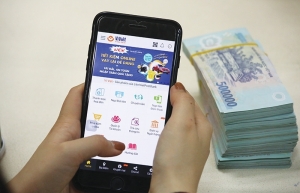AI becoming increasingly prevalent for e-payments
Prof Tran Hung Son, director of the Institute for Development and Application of Technology in Banking at the Vietnam National University in Ho Chi Minh City, has expressed his concern that Vietnam is among the countries most severely impacted by digital payment fraud.
 |
| AI becoming increasingly prevalent for e-payments, illustration photo/ Source: freepik.com |
“The loss rate due to digital fraud in Vietnam stands at 3.6 per cent of GDP, significantly higher than the global average of 1.1 per cent and surpassing countries like Brazil and Thailand, both at 3.2 per cent,” he noted at a June seminar on digital payment in Ho Chi Minh City.
In contrast, many developed countries report much lower loss rates, such as Belgium and Ireland at 0.1 per cent, and the Netherlands at 0.2 per cent.
Major General Nguyen Van Giang, deputy director of the Cybersecurity and High-Tech Crime Prevention Department under the Ministry of Public Security, said that in 2023, the Vietnam Information Security Warning Portal recorded approximately 13,900 cyberattacks on various agencies and organisations, and nearly 16,000 reports of online fraud, resulting in losses exceeding $16.25 billion.
“Of this, individuals were defrauded of around $333 million to $417 million, a 50 per cent increase compared to 2022. Up to 75 per cent of mobile device and social media users received fraudulent messages or calls,” stated Giang.
He acknowledged that despite stringent measures to prevent and combat high-tech crimes, challenges persist. “The anonymity of online activities and cross-border operations exploiting legal loopholes complicate the tracking and handling of these crimes,” Giang explained. “Fraudsters operate in organised groups, creating elaborate schemes and thoroughly exploiting technology.”
According to Giang, five typical fraud methods have been identified: scams via telecommunication services; fraud in the financial and banking sectors; scams through social media; fraudulent investment calls; and scams involving recruitment for e-commerce platforms like Shopee, Lazada, and Tiki.
On the other hand, Ngo Tuan Anh, director of SCS Network Company believed that a proactive measure being implemented is biometric authentication for money transfers over $415 per transaction or a total of $830 per day, effective from July 1, according to a December 2023 rule on implementation of methods to ensure safe and secure online payments and bank card payments by the State Bank of Vietnam (SBV).
Anh said, “Online scams commonly involve criminals obtaining victims’ personal information and using disposable SIM cards. Facial authentication for transfers will be an effective solution to prevent criminals from using borrowed accounts to transfer money.”
He also recommended enhancing the management of registered SIM cards and protecting personal information to effectively combat fraud.
On the banking front, Pham Chau Loan, deputy head of Digital Channel and Partnership Development Department at Vietcombank, revealed that the bank is actively implementing biometric solutions to ensure transaction safety and security. “Biometric customer authentication guarantees data accuracy and reliability without hindering the user experience,” she said.
Similarly, ACB’s CEO Tu Tien Phat reported that their facial authentication system has received positive customer feedback.
“Within just three days of implementation, 30,000 customers have completed facial authentication, with each process taking less than 30 seconds,” Phat added.
Dang Tuyet Dung, country manager of Visa for Vietnam and Laos, disclosed that Visa has invested over $416 million in AI-based solutions to prevent fraud and enhance security awareness.
“Visa is also employing tokenisation technology to encrypt transactions, removing private cardholder information from the payment flow and enhancing security. We are working with banks and partners to implement data-based authentication methods for e-commerce transactions, following trends in developed markets like Singapore and Malaysia,” she explained.
Discussing customer authentication processes, Nguyen Dang Hung, deputy CEO of National Payment Corporation of Vietnam, explained that banks previously relied on one-time passwords for authentication, with some requiring additional layers of verification depending on their risk appetite.
“These layers of authentication directly impact the seamless customer experience,” he noted. “The 3D Secure authentication solution for domestic cards aims to balance safety, security, and convenience for customers. This solution supports modern biometric authentication methods, such as fingerprints and facial recognition, and uses AI-based risk assessment to customise additional verification requirements, reducing the risk of fraud in online transactions.”
By exchanging larger volumes of transaction data than before, banks can now access information about devices, transaction locations, and transaction values. This allows them to analyse and evaluate risks based on historical data, thus making informed decisions on the appropriate customer authentication method, ultimately providing a better payment experience, Hung said.
 | E-wallet services to facilitate online payment convenience While there have been issues relating to peer-to-peer and other digital lending and e-payments solutions in Vietnam as of late, one of the most advanced areas of fintech in the country currently is the increasing use of e-wallets. Dung Dang, managing partner at Indochine Cousel, writes on the existing rules for e-wallets in Vietnam and how they pertain to privacy and accessibility. |
 | Vietnamese firms partner to develop telecom services, e-payment in Cambodia Metfone, the Cambodia-based affiliate of the military-run telecom group Viettel, and Angkok Dairy Products Co.Ltd (Angkormilk), two Vietnamese-invested firms, on July 14 signed a strategic cooperation agreement to develop telecommunications services and e- payments in Cambodia. |
 | Cashless payments in e-commerce to account for 50 per cent by 2025 The Ministry of Industry and Trade (MoIT) has set a target to increase the cashless payment ratio in e-commerce, especially e-payments through payment intermediaries or applications, to 50 per cent by 2025. |
What the stars mean:
★ Poor ★ ★ Promising ★★★ Good ★★★★ Very good ★★★★★ Exceptional
 Tag:
Tag:
Related Contents
Latest News
More News
- Banking sector targets double-digit growth (February 23, 2026 | 09:00)
- Private capital funds as cornerstone of IFC plans (February 20, 2026 | 14:38)
- Priorities for building credibility and momentum within Vietnamese IFCs (February 20, 2026 | 14:29)
- How Hong Kong can bridge critical financial centre gaps (February 20, 2026 | 14:22)
- All global experiences useful for Vietnam’s international financial hub (February 20, 2026 | 14:16)
- Raised ties reaffirm strategic trust (February 20, 2026 | 14:06)
- Sustained growth can translate into income gains (February 19, 2026 | 18:55)
- The vision to maintain a stable monetary policy (February 19, 2026 | 08:50)
- Banking sector faces data governance hurdles in AI transition (February 19, 2026 | 08:00)
- AI leading to shift in banking roles (February 18, 2026 | 19:54)





















 Mobile Version
Mobile Version